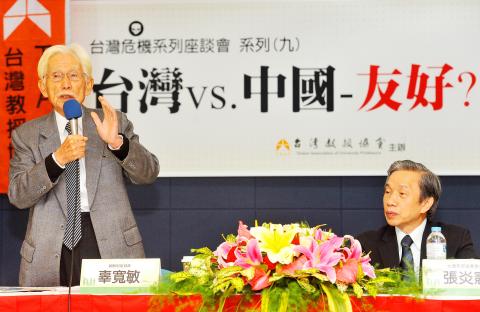The Democratic Progressive Party (DPP) has yet to figure out why it lost this year’s presidential election and remains directionless almost one year later, independence advocate Koo Kwang-ming (辜寬敏) said yesterday.
Koo, one of the most vocal heavyweights in the pro-independence camp, expressed his disappointment with the party in a speech delivered at an event organized by the Taiwan Association of University Professors.
“I waited for almost one year before expressing my views today. Did the DPP conduct a comprehensive review of the election to understand why it lost? From what I’ve seen, the party hasn’t changed and factionalism still dominates its Central Standing Committee,” the 87-year-old said.

Photo: Chien Jung-fong, Taipei Times
Koo also expressed a particular displeasure with DPP Chairman Su Tseng-chang (蘇貞昌), former party chairperson and presidential candidate Tsai Ing-wen (蔡英文), and former premier Frank Hsieh (謝長廷) in his 90-minute speech.
The DPP cannot possibly hope to regain the people’s trust by waiting for President Ma Ying-jeou (馬英九) and his Chinese Nationalist Party (KMT) to fail, Koo said, adding that the DPP’s approval rating remained low despite Ma’s own dismal 13 percent approval figures.
Koo praised Su’s efforts to visit local communities and reconnect with grassroots supporters, but criticized the party headquarters for “taking people’s support for granted and sitting idle amid Ma’s incompetence.”
The DPP should have been more vocal in its efforts to recall the president and amend the Constitution, he told the audience.
Regarding Tsai, Koo said her US affairs campaign team had been understaffed, with DPP Legislator Hsiao Bi-khim (蕭美琴) serving as the sole aide. The campaign team had underestimated the importance of Tasi’s US visit, the mismanagement of which had significantly hurt her election bid, he said.
Koo said Hsieh’s remarks during his landmark visit to China in October were “inappropriate” and he disagreed with the former premier’s initiative of “one Constitution with different interpretations (憲法各表).”
“The DPP is the only hope Taiwanese have because the Taiwan Solidarity Union remains weak. The DPP has to keep up with the times and reignite people’s passion for politics,” Koo said.
Ma’s low approval rating reflects not only his “incompetence, carelessness and cold-bloodedness,” but also the people’s opposition to his administration, Koo said.
In terms of cross-strait relations, the senior politician said Beijing’s Taiwan strategy “has been a total failure” because anti-China sentiment among Taiwanese has increased.
“I boldly predict that China will not annex Taiwan by force because doing so could place its economy at risk of being hit by international economic sanctions,” he said.

The Ministry of Economic Affairs has fined Taobao NT$1.2 million (US$36,912) for advertisements that exceed its approved business scope, requiring the Chinese e-commerce platform to make corrections in the first half of this year or its license may be revoked. Lawmakers have called for stricter enforcement of Chinese e-commerce platforms and measures to prevent China from laundering its goods through Taiwan in response to US President Donald Trump’s heavy tariffs on China. The Legislative Yuan’s Finance Committee met today to discuss policies to prevent China from dumping goods in Taiwan, inviting government agencies to report. Democratic Progressive Party Legislator Kuo Kuo-wen (郭國文) said

The Ministry of Economic Affairs has fined Taobao NT$1.2 million (US$36,900) for advertisements that exceeded its approved business scope and ordered the Chinese e-commerce platform to make corrections in the first half of this year or its license would be revoked. Lawmakers have called for stricter supervision of Chinese e-commerce platforms and more stringent measures to prevent China from laundering its goods through Taiwan as US President Donald Trump’s administration cracks down on origin laundering. The legislature’s Finance Committee yesterday met to discuss policies to prevent China from dumping goods in Taiwan, inviting government agencies to report on the matter. Democratic Progressive Party

Taiwan and its Pacific ally Tuvalu on Tuesday signed two accords aimed at facilitating bilateral cooperation on labor affairs, according to Taiwan’s Ministry of Foreign Affairs (MOFA). The governments inked two agreements in Taipei, witnessed by Foreign Minister Lin Chia-lung (林佳龍) and visiting Deputy Tuvaluan Prime Minister Panapasi Nelesone, MOFA said in a news release. According to MOFA, the agreements will facilitate cooperation on labor issues and allow the two sides to mutually recognize seafarers’ certificates and related training. Taiwan would also continue to collaborate with Tuvalu across various fields to promote economic prosperity as well as the well-being of their

Sung Chien-liang (宋建樑), who led efforts to recall Democratic Progressive Party (DPP) Legislator Lee Kun-cheng (李坤城), was released on bail of NT$80,000 today amid outcry over his decision to wear a Nazi armband to questioning the night before. Sung arrived at the New Taipei District Prosecutors’ Office for questioning in a recall petition forgery case last night wearing a red armband bearing a swastika, carrying a copy of Adolf Hitler’s Mein Kampf and giving a Nazi salute. Sung left the building at 1:15am without the armband and covering the book with his coat. Lee said today that this is a serious